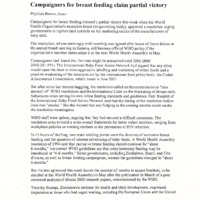Campaigners for breast feeding claim partial victory
Item
- Title
- Campaigners for breast feeding claim partial victory
- extracted text
-
SDA-RF-CH-1.51
BMJ 2001:322:191 ( 27 January)
News
Campaigners for breast feeding claim partial victory
Phyllida Brown, Exeter
Campaigners for breast feeding claimed a partial victory this week when the World
Health Organization's executive board (its governing body), approved a resolution urging
governments to tighten their controls on the marketing tactics of the manufacturers of
baby milk.
The resolution, whose seemingly mild wording was agreed after hours of fierce debate at
the annual board meeting in Geneva, will become official WHO policy if the
organisation's member states adopt it at the next World Health Assembly in May.
Campaigners had feared that the vote might be postponed until 2002 (BMJ
2000;321:591). The International Baby Food Action Network had argued that any delay
would open the door to more aggressive labelling and marketing of infant foods and a
possible weakening of the standards set by the international food policy body, the Codex
Alimentarius Commission, which meets in June 2001.
But after some last minute haggling, the resolution called on the commission to "take
account of WHO resolutions and the International Code on the Marketing of Breast-milk
Substitutes when setting its own infant feeding standards and guidelines. Patti Rundall of
the International Baby Food Action Network said that the timing of the resolution before
June was "crucial." But she warned that any fudging in the coming months could render
the resolution meaningless.
WHO staff were upbeat, arguing that they had secured a difficult consensus. The
resolution aims to build a wide overall framework for better infant nutrition, ranging from
workplace policies on nursing mothers to the prevention of HIV infection.
In 13 hours of drafting, two main sticking points were the duration of exclusive breast
feeding and the question of internet advertising of baby foods. A World Health Assembly
resolution of 1994 said that exclusive breast feeding should continue for "about
6 months," but current WHO guidelines say that complementary feeding may be
introduced at "4-6 months." Some governments, including Zimbabwe, Brazil, and Cite
d'Ivoire, as well as breast feeding campaigners, wanted the guidelines-changed to "about
6 months."
But the text approved this week leaves the number of months in square brackets, to be
decided at the World Health Assembly in May after the publication in March of a peer
reviewed analysis of almost 3000 research papers, commissioned by the WHO.
Timothy Stamps, Zimbabwe's minister for health and child development, expressed
impatience at those who had urged waiting, including the European Union and the United
States. "They don't see the really serious situation with ... the progressive elimination of
breast feeding as a strategic national resource in countries like ours in Africa," he said.
Dr Graeme Clugston, WHO's director of nutrition for health and development, defended
waiting for the scientific review and said that the agency was "simply anxious to make
sure that whatever comes out in the scientific process will be reflected in policy." Several
developing countries had called for tighter controls on companies that promote baby
foods on the internet.
But the United States fiercely opposed such controls, arguing that they are unworkable.
"Regrettably the US is very anxious not to inhibit commercial activity," said Mr Stamps.
In the end, the call for a curb on electronic advertising was kept in the resolution,
although the wording is non-specific.
The text calls on governments "to strengthen national mechanisms to ensure global
compliance with the International Code ... with regard to labelling as well as all forms of
advertising, and promotion in all types ofmedia."
- Media
 SDA-RF-CH-1.51.pdf
SDA-RF-CH-1.51.pdf
Position: 3963 (2 views)
